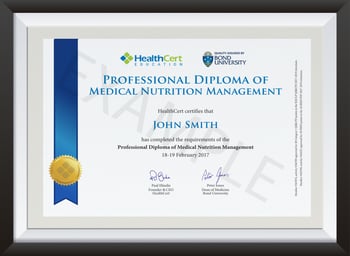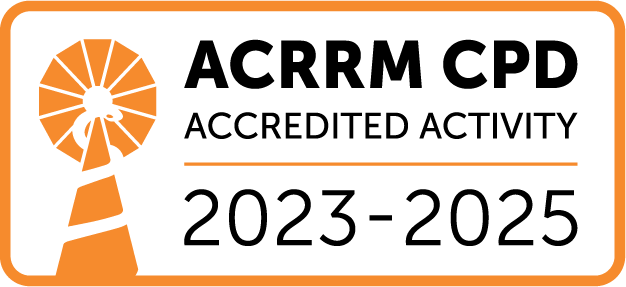
Despite the prevalence of nutritional disorders and an increasing amount of evidence showing the significance of diet in disease prevention, medical doctors are typically untrained in the relationship of nutrition to health and disease. This online program is quality-assured by Bond University, CPD accredited, and tailored for medical professionals who wish to gain a better understanding of nutrition management in order to improve patient outcomes, especially for those patients with conditions commonly seen in general practice.
The online medical courses in clinical nutrition explore the role of therapeutic diets in the treatment of chronic illnesses and other nutritional disorders, highlighting the principles of the nutrition care process as applicable in a primary care setting. You will learn key nutrition assessment techniques and intervention strategies that will assist you in providing comprehensive primary health care to your patients.
This Primary Certificate course allows you to gain an insight into the HealthCert certificate program in Patient Nutrition Management by exploring one of the most prevalent topics in the field. This short course provides a direct credit into the full nutrition pathway.
The Professional Certificate course will teach the foundations of dietary guidelines and help you understand how they can be applied in general practice to better manage medical conditions.
The Advanced Certificate course will increase your clinical knowledge of medical nutrition strategies that can be implemented to improve patient outcomes.
The courses are suitable for medical doctors, degree-qualified nurses who work under their supervision, degree-qualified health professionals, and International Medical Graduates.
Participants do not have to pass an IELTS test but, as the courses are delivered in English, proficiency in listening, reading and writing English is assumed.
Study at your own pace and to your own schedule. Interactivity, discussion, and feedback opportunities are included.
Professional Certificate
Advanced Certificate of Medical Nutrition Management
Professional Diploma of Medical Nutrition Management

Prof Liz Isenring
Program Head, Master of Nutrition and Dietetic Practice, Bond University
Associate Dean of Research, Bond University
Professor Liz Isenring is an Advanced Accredited Practising Dietitian passionate about improving the quality of life of patients and their carers via evidence-based nutrition. Liz is Head of Program for the Master of Nutrition and Dietetic Practice, and the Associate Dean of Research for the Faculty of Health Sciences and Medicine at Bond University. She is recognised internationally as an expert in nutrition during treatment for cancer and for older adults. Liz has held several leadership positions including in AuSPEN, Dietitian Connection and MASCC, has published over 130 peer-reviewed papers and received more than $3 million AUS in research funding.

A/Prof Gregory Cox
Associate Professor, Nutrition and Dietetics Program, Bond University
Associate Professor Gregory Cox is a Fellow of Sports Dietitians Australia (SDA) and an Accredited Practising Dietitian. He worked at the Australian Institute of Sport for 20 years and is currently the Nutrition Lead for Triathlon Australia and Paddle Australia. In 2016, Greg was the Nutrition Lead for the Australian Olympic Team at the Rio Olympic Games. He currently works at Bond University as an Associate Professor within the Nutrition and Dietetics program alongside his consultancy work in elite sport.
He is committed to making a difference within his daily work, be it teaching undergraduate or graduate students, working with elite athletes and coaches or undertaking applied research in sport and the wider nutrition field. He publishes original research, has written sports nutrition books and book chapters alongside countless sports nutrition periodicals. He loves travel, for work and holidays and regularly heads overseas for training camps, conferences, major sporting events or for his own holidays chasing the snow and waves!! He is a lifelong athlete and has maintained a competitive spirit in Triathlon and Surf Life Saving. Given his skill in poaching fresh, local eggs, he has often discussed the possibility of opening a restaurant with his son, Sebastian based on this theme - O for Awesome!!

A/Prof Stijn Soenen
Clinical researcher, Bond University
Associate Professor Stijn Soenen joined Bond University in 2019. He is a clinical researcher, with a passion to teach, who specialises in nutrition. He completed a Bachelor of Science in Nutrition and Dietetics (Leuven, Belgium), and a Master of Science (high distinction) and PhD in Biological Health Sciences at Maastricht University (Maastricht, the Netherlands). In 2011, he relocated to Australia to expand his research skills within the NHMRC Centre of Clinical Research Excellence (CCRE) in Nutritional Physiology, Interventions and Outcomes and the Centre of Research Excellence (CRE) in Translating Nutritional Science to Good Health supported by the Mary Overton and Florey Fellowships from the Royal Adelaide Hospital Research Foundation (2011-18). He maintains strong links with the CRE at the University of Adelaide and the Central Adelaide Local Health Network (CALHN).
Stijn has established an international reputation in the field of physiological mechanisms underlying energy balance (the regulation of energy intake and energy expenditure), particularly on the role of dietary protein on body weight, muscle mass and function, which is of major importance to health outcomes. He leads a program of research relating to malnutrition, over- (e.g., bariatric surgery patients) and undernutrition (frailty), and type 2 diabetes, in older people. His complex, and technically demanding, clinical studies, performed in internationally recognised research environments, have been published in leading journals in his field. His research has been awarded on several occasions and supported by >$2M including a principal investigator Diabetes Australia Research Trust (DART) Grant related to postprandial glucose metabolism in older people (CIA, 2019), an NHMRC grant related to muscle protein accretion in ICU patients (CIC, 2018-20), and a further 21 project grants. He regularly presents at national and international conferences, reviews papers, grant applications, student-research proposals and conference abstracts, and chairs conference sessions.

Dr Eirini Dimidi
Research Associate, Department of Nutritional Sciences, King’s College London, UK
Dr Eirini Dimidi is a nutritionist and registered dietitian since 2011. She has been awarded a PhD from King’s College London where she investigated the symptomatic, physiological and microbiological effect of probiotics in people with constipation. In 2016, she was appointed as a Research Associate at the Department of Nutritional Sciences, King’s College London, where she is undertaking several research projects on the impact of nutritional interventions (fibre, probiotics, prebiotics, low FODMAP diet) in people with functional bowel disorders. Other research projects include investigating the effect of diet on the gut microbiota and gut health, as well as exploring patients’ perceptions of gut diseases. She has published in several peer-reviewed nutrition and gastroenterology journals and has presented her work in national and international conferences.

Dr Hannah Mayr
Post-doctoral researcher, Princess Alexandra Hospital (PAH), Brisbane
Dr Hannah Mayr is an Accredited Practicing Dietitian who recently completed her PhD thesis at La Trobe University. Under the principal supervision of leading Mediterranean diet researcher, Prof Catherine Itsiopoulos, she investigated the effect of a Mediterranean versus low-fat diet on inflammation and adiposity in patients with coronary heart disease.
Hannah has published a number of reviews, methods and results-based papers within this work and received the ‘New Researcher Award’ at the 2018 Dietitians Association of Australia National Conference for her thesis work exploring a novel dietary assessment tool, the Dietary Inflammatory Index. Her research and practice interests are in dietary patterns and interventions, chronic disease and metabolic health.
Hannah currently works as a post-doctoral researcher at Princess Alexandra Hospital (PAH) in Brisbane and externally with La Trobe, which includes activities to enable implementation of the Mediterranean diet into routine care for chronic disease management. At PAH she leads a mentorship group focused on research capacity building for clinical dietitians. She also teaches into the Master of Nutrition and Dietetics at Bond University and she is passionate about engaging dietetics students in research activities.

Dr Heidi Staudacher
Dietitian & Postdoctoral Researcher, Food and Mood Centre, Deakin University
Dr Heidi Staudacher is a dietitian and postdoctoral researcher at the Food and Mood Centre at Deakin University. Her chief research interests include the pathophysiology and dietary management of functional gastrointestinal and mental health disorders, and the interaction of diet with the microbiome in these disorders.
Heidi was a NIHR Clinical Doctoral Fellow at King’s College London between 2012-2016 and during her PhD conducted a large randomised controlled trial investigating the effect of a low FODMAP diet with probiotic co-administration on the gastrointestinal microbiota, symptoms, dietary intake and quality of life. She has published several key papers in the field of dietary management of irritable bowel syndrome.

Dr Ingrid Hickman
Principal Research Fellow, Department of Nutrition and Dietetics, Princess Alexandra Hospital and Mater Research Institute-UQ
Dr Ingrid Hickman is a Principal Research Fellow with the Department of Nutrition and Dietetics at the Princess Alexandra Hospital and the Mater Research Institute-UQ in Brisbane, Australia. Ingrid’s work specialises in investigating the metabolic factors that contribute to obesity-related chronic disease, particularly the role of diet and exercise as potential treatment options for chronic liver disease.
Ingrid collaborates nationally and internationally with multidisciplinary teams to deliver scientifically robust evidence for better management of obesity-related disease. The focus of her research team is to translate medical research findings into improved evidence-based practice for clinicians treating people with obesity-related chronic disease.

Dr Jaimon Kelly
Senior Teaching Fellow, Bond University

Dr Kate Morgan
Academic, Bond University
Dr Kate Morgan has been an academic with Bond University since 2012. Her teaching with dietetics students has focused on food science and nutrition, and its application across dietetic practice. This has involved leading future dietitians on culinary investigations in the food lab as well as informative paddock-to-plate expeditions outside the university.
Kate recently completed her PhD in dietetics education, taking a national approach to exploring key stakeholders’ perspectives on dietetics workforce preparation and preparedness. Through her PhD, Kate authored six peer-reviewed publications and presented the findings of her research at conferences both nationally and internationally.
Prior to academia, Kate was a dietitian in the corporate sector. This involved working with multinational companies to enhance the nutritional profile of their products while maintaining palatability, meeting business needs and effectively communicating credible nutrition information to consumers.
Kate has been an Accredited Practising Dietitian and member of the Dietitians Association of Australia since 2008.

Dr Lauren Ball
Senior Research Fellow, Griffith University
Early Career Fellow, NHMRC
Associate Editor, Australian Journal of Primary Health
Executive Committee Member, Australasian Association for Academics in Primary Care
Dr Lauren Ball’s vision is that all Australians are supported by a health care system that allows them to reach their full potential in life. This will be achieved by making nutrition a prominent part of the ongoing care they receive in general practice – the first point of contact with the health care system.
Lauren has worked with community members, health professionals, education providers and professional bodies to conduct research on how patients can be better supported in general practice to eat well. She implements interventions and programs so that general practitioners, nurses, dietitians, nutritionists, pharmacists and other health professionals feel confident in nutrition and have the skills to best meet patients' needs. She also works with Primary Health Networks to better understand how primary care services can be reoriented to put nutrition and other lifestyle behaviours at the forefront of the health care system.
Lauren has published over 100 peer-reviewed scientific articles and attracted over $1 million in research funding from government bodies, non-government organisations and philanthropic foundations. She is a Senior Research Fellow at Griffith University and an NHMRC Early Career Fellow. She is also an Associate Editor for the Australian Journal of Primary Health and Executive Committee Member of the Australasian Association for Academics in Primary Care.

Dr Stan Steindl
Clinical Psychologist, Psychology Consultants Pty Ltd
Adjunct Associate Professor, School of Psychology, The University of Queensland
Co-director, UQ Compassionate Mind Research Group
Dr Stan Steindl is a Clinical Psychologist in private practice at Psychology Consultants Pty Ltd, and an Adjunct Associate Professor at School of Psychology, The University of Queensland, Australia. He is also co-director of the UQ Compassionate Mind Research Group. He has over 20 years’ experience as a therapist, supervisor and trainer, especially providing training in Motivational Interviewing (MI). His PhD examined the use of MI with combat-related posttraumatic stress disorder and comorbid alcohol dependency, and he continues to work in the areas of trauma, addiction and health behaviour change, as well as having a general clinical practice. He is an active member of the Motivational Interviewing Network of Trainers (MINT), and delivers training in an engaging, informative and practical ways.

Dr Tetyana Rocks
Head of Translational and Educational stream, Food & Mood Centre, Deakin University
Dr Tetyana Rocks is a postdoctoral research fellow and Head of Translational and Educational stream at the Food & Mood Centre, Deakin University. Her main role within the centre is to support the translation of the current evidence in the field of Nutritional Psychiatry into policy and clinical practice through education and training of health professionals and the wider community in Australia and internationally. Tetyana is also continuing to developing her research in eating disorders, focusing on the role of gut microbiota in treatment. Tetyana is an Accredited Practicing Dietitian with extensive experience in tertiary education.

Dr Treasure McGuire
PhD, BPharm, BSc, GradDipClinPharm, GCHEd, CertIVTAE, Adv Prac Pharm, FACP, FPS, MSHP
Assistant Director of Pharmacy (Practice and Development), Mater Health
Associate Professor of Pharmacology, Bond University
Dr Treasure McGuire is a passionate medicines information pharmacist, pharmacologist, educator and researcher. She is an Assistant Director of Pharmacy (Practice and Development), Mater Health, Brisbane and holds two senior conjoint academic appointments between Mater, the School of Medicine, Bond University and School of Pharmacy, The University of Queensland (UQ). She is also currently national president of the Australian College of Pharmacy.
As Associate Professor of Pharmacology, Bond University, Dr McGuire aims to transform medical students from ‘doctor as scientist’ to ‘prescriber ready clinicians’. For her work in education at UQ, she was a member of the Postgraduate Clinical Pharmacy Program Team that received the 2016 UQ Faculty of Health and Behavioural Sciences Award for Programs that Enhance Learning (APEL) and a 2017 UQ Commendation for these programs.
Dr McGuire collaborates with academic GPs in patient centred research, in the domains of medicines information, evidence-based practice, medication safety, reproductive health and complementary medicines.

Christina Turner
Senior Teaching Fellow and Internships Lead, Master of Nutrition and Dietetic Practice Program, Bond University
Christina Turner is an Accredited Practising Dietitian with almost 19 years’ experience working across a variety of settings including acute dietetics, community outpatients, public health and community development. More recently she has specialised in eating disorders and established SOL nutrition, a non-diet private practice in northern New South Wales, Australia.
Christina is currently a Senior Teaching Fellow and Internships Lead within the Master of Nutrition and Dietetic Practice Program at Bond University. She teaches into the clinical and communication/counselling subjects including eating disorders, weight-inclusive practice and non-diet nutrition, cognitive-behavioural therapy and motivational interviewing topics.

Greg Shaw
Nutrition Lead, Australian swimming
Greg Shaw is a sports dietitian that has developed his experience in sports nutrition over the past 25 years. Five of those years were first-hand, as an international ranked swimmer and a member of the Australian Swim Team. Since completing his degree in 2000, Greg has worked with elite teams such as the Brisbane Lions (premiership 03), Queensland Reds and has worked individually with Olympic champions and world record holders consulting to Australian, Queensland and British swimming teams, and the Queensland Academy of Sport. He spent ten years as a senior sports dietitian at the Australian Institute of Sport. He is currently the Nutrition Lead for Australian swimming. Greg was a board member of Sports Dietitians Australia for over 10 years and was instrumental in developing their professional development framework and is currently a member of SDA’s education committee.
Greg is passionate about sports nutrition and ensuring athletes and sports health professionals practice performance focused, safe and legal sports nutrition practices. Greg is currently a member of numerous national sporting bodies, Sport Supplement Policy panels, and was involved in the development of the AIS Sport Supplement Framework. Greg has completed research into the use of dietary supplements by swimmers, including what drives supplement use and how this use has changed over time in relation to regulatory and policy changes.

Kathryn Nolan
Senior Teaching Fellow, Bond University

Kathy Beck
Chair, Dietitian Subcommittee, Australasian Society of Clinical Immunologists and Allergists (ASCIA)
Kathy Beck has more than 35 years’ experience working as a registered nurse and a dietitian in clinical dietetics, across all types of home and hospital settings both in Australia and the UK. Kathy is an Accredited Practicing Dietitian and in the last 10 years has specialised in paediatric clinical dietetics across a diverse range of specialty areas but specifically within paediatric food allergy. She is the recognised paediatric allergy dietitian across Queensland and lectures in the area of paediatric food allergy to dietetic students, dietitians, GPs and paediatricians.
Kathy is the Chair of the Dietitian Subcommittee of the Australasian Society of Clinical Immunologists and Allergists (ASCIA) which aims to provide up-to-date educational resources for health professionals and families living with food allergy. Kathy is an active member of the International Network of Diet and Nutrition in Allergy (INDANA) and regularly attends National and International food allergy conferences to broaden and update her skills.

Peta Paterson
Accredited Practising Dietitian and Senior Teaching Fellow, Bond University
Peta Patterson is an Accredited Practising Dietitian and Senior Teaching Fellow at Bond University. Her teaching focuses on community and public health nutrition issues and its application to improving the health of the population. Prior to academia she has worked as a dietitian in the general practice setting supporting patients to achieve optimum health through nutrition. She has also spent over 10 years as a Senior Public Health Nutritionist with a primary focus on the health of mothers, infants and children. She has been a member of the Dietitians Association of Australia since 2001.

Shane Jeffrey
Accredited Sports Dietitian
Treasurer, Australian & New Zealand Academy for Eating Disorders
Founder, River Oak Health
Founder, Food Mind Body
Shane Jeffrey is an Accredited Practicing Dietitian and Accredited Sports Dietitian with 25 years of experience as a dietitian in both the private and public sectors, working almost exclusively in the field of eating disorders, the non-diet approach and sports nutrition. Shane is the current treasurer and a past executive member of the Australian & New Zealand Academy for Eating Disorders, a past chairperson for the nutrition interest group for the Academy for Eating Disorders, and a past chairperson for the Eating Disorder Interest Group for the Dietitians Association of Australia.
Shane has a passion for supporting the education of health professionals in the eating disorders, teaching into four universities, facilitating workshops, and presenting at various national and international conferences. Shane is the founder of River Oak Health and Food Mind Body, two Queensland-based private practices dedicated to the treatment of eating, weight and body image concerns.

Tara Diversi
Business, Communication and Leadership Consultant, Health Leadership Australia
Co-Founder, Sophus Nutrition
Tara Diversi is passionate about combining nutrition, psychology and communication to help clients make positive change to improve their health. She is an Accredited Practising Dietitian with two post graduate qualifications in psychology and an MBA majoring in marketing, which complement her dietetic qualifications. Tara works as a business, communication and leadership consultant with Health Leadership Australia. She is the co-founder of Sophus Nutrition, a platform that combines nutrition with behavioural economics and technology to bring dietetic care into homes of patients across the globe.
|
|
GP REGISTRARS: Doctors in training who are on a pathway to General Practice Registration through a recognised training provider receive a HealthCert Scholarship and save $500 on face-to-face certificate courses (two-day practical workshops) and $300 on online and hybrid certificate courses (one-day practical workshop with supporting online theory). This offer cannot be used in conjunction with the Early Bird special.
Each of the three levels of this course consists of eight modules which are delivered online and can be viewed and replayed at any time. All courses include:
There is a six-month exam period for the Professional and Advanced Certificates. In order to pass the assessment and progress to the next course, you must complete the assessment online. Exam extensions are available on a case by case basis.
Online activities for the Professional and Advanced Certificates include a pre-course activity, responding to interactive case discussions, knowledge- and scenario-based questions, two interactive webinars, and a post-course activity.
Online activities for the Professional Diploma level include a pre-course activity, literature review, responding to interactive case discussions, knowledge- and scenario-based questions, two interactive webinars, and a post-course activity. A clinical audit is also a module of the Professional Diploma designed to demonstrate your application of learning in clinical presentations. The clinical audit is separately accredited.
Online assessment
In order to meet the requirements of professional and academic learning, the course assessment includes professional requirements and two online examinations.
HealthCert recommends completion of all requirements at your convenience within six months of the start of a cohort for the Professional and Advanced Certificates and within 12 months for the Professional Diploma.

Upon successful completion of the exam, course participants will receive the respective Certificates of Medical Nutrition and below points. To learn more about the delivery of certificates in Australia and overseas, please visit our FAQs.
This program:
This online three-part program consists of the Professional Certificate, Advanced Certificate, and Professional Diploma of Medical Nutrition Management.
Postgraduate pathway for Medical Nutrition Management
Medical professionals who successfully complete the HealthCert Professional Diploma of Medical Nutrition Management will be eligible to apply for recognition of prior learning for NUTR71-103: Nutrition Issues and Priorities at Bond University. This subject may lead to a pathway into the Graduate Certificate in Evidence Based Practice (or other exit points within the Master of Healthcare Innovations), or the Graduate Certificate in Nutrition at Bond University. Learn more.
Postgraduate scholarships for Medical Nutrition Management
HealthCert graduates who successfully complete the Professional Diploma of Medical Nutrition Management receive a scholarship of up to £500 (approximately $1,000) towards the Master of Science in Obesity and Weight Management and the Master of Science in Sports Nutrition (to be offered in 2021). The postgraduate courses are offered entirely online through DiplomaMSc in the UK and awarded by the University of South Wales. This scholarship is only available to HealthCert alumni. Learn more or enrol here.



Our Education Advisors can assist you with any queries and tailor your education pathway to suit your current expertise, interests and career goals.